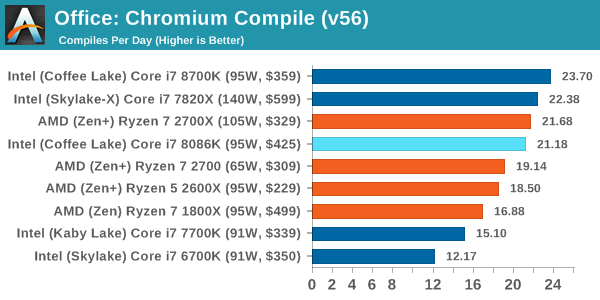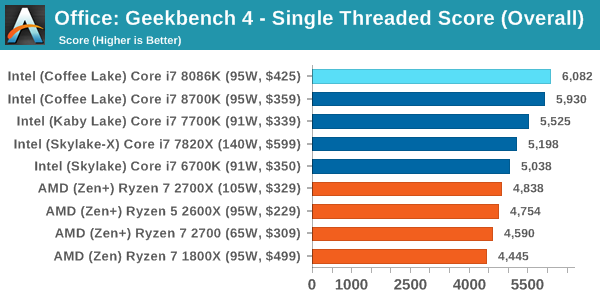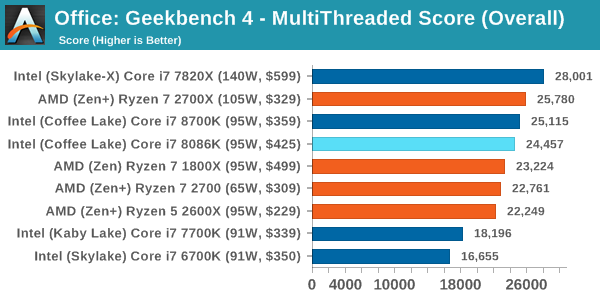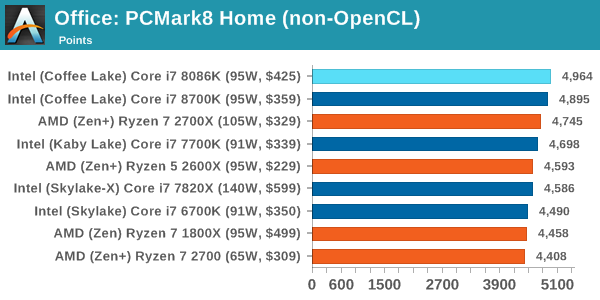The Intel Core i7-8086K Review
by Ian Cutress on June 11, 2018 8:00 AM EST- Posted in
- CPUs
- Intel
- Core i7
- Anniversary
- Coffee Lake
- i7-8086K
- 5 GHz
- 8086K
- 5.0 GHz
Benchmarking Performance: CPU Office Tests
The office programs we use for benchmarking aren't specific programs per-se, but industry standard tests that hold weight with professionals. The goal of these tests is to use an array of software and techniques that a typical office user might encounter, such as video conferencing, document editing, architectural modelling, and so on and so forth.
All of our benchmark results can also be found in our benchmark engine, Bench.
Chromium Compile (v56)
Our new compilation test uses Windows 10 Pro, VS Community 2015.3 with the Win10 SDK to combile a nightly build of Chromium. We've fixed the test for a build in late March 2017, and we run a fresh full compile in our test. Compilation is the typical example given of a variable threaded workload - some of the compile and linking is linear, whereas other parts are multithreaded.

This is another case where I think our improvised testbed is playing a bigger part, and I'd like to eventually re-run this on my standard testbed. Especially as compiling heavily hits more than just the CPU.
GeekBench4: link
Due to numerous requests, GeekBench 4 is now part of our suite. GB4 is a synthetic test using algorithms often seen in high-performance workloads along with a series of memory focused tests. GB4’s biggest asset is a single-number output which its users seem to love, although it is not always easy to translate that number into real-world performance comparisons.


Like CineBench, the Core i7-8086K does will on the synthetic single threaded test.
PCMark8: link
Despite originally coming out in 2008/2009, Futuremark has maintained PCMark8 to remain relevant in 2017. On the scale of complicated tasks, PCMark focuses more on the low-to-mid range of professional workloads, making it a good indicator for what people consider 'office' work. We run the benchmark from the commandline in 'conventional' mode, meaning C++ over OpenCL, to remove the graphics card from the equation and focus purely on the CPU. PCMark8 offers Home, Work and Creative workloads, with some software tests shared and others unique to each benchmark set.

Here the 8086K does eek out a win over the 8700K, although just barely.










111 Comments
View All Comments
mkaibear - Tuesday, June 12, 2018 - link
"Total flop"I suggest benchmarking the CPU in your phone against this CPU and try again.
SanX - Tuesday, June 12, 2018 - link
They mostly serve different purposes and apps and have different TDP. But if you restrict consumption power of Intel processors to the same one of mobile processors then in the same apps it's not clear in advance which one will win.Time for ARM to look at the server and supercomputers markets.
iranterres - Monday, June 11, 2018 - link
HAHA. Intel once again trying to fool some people and appeasing the fanboys with something worthless and expensive.xchaotic - Tuesday, June 12, 2018 - link
So are the regular i7-8600K unable to run all core 5GHz? If so, what't the max stable freq for a non-binned i7-8600K? Personally I went for an even lower/cheaper i5-8400 CPU, but I see why some people prefer to be running max speed all the time...Rudde - Tuesday, June 12, 2018 - link
I assume you mean the i7-8700k.There is a phenomenon called 'the silicon lottery.' Basically, when you buy an i7-8700k, you can't know the max stable frequency. It could max out at 5.2GHz or it could only reach 4.7GHz before going unstable. The thing is, you can't know what you'll end up with.
This brings us to the i7-8068k. The i7-8068k is pretty much guaranteed to have a max stable frequency above 5GHz. Of course, this matters only when overclocking.
Bradyb00 - Tuesday, June 12, 2018 - link
Is it a lower temp than a 8700k for a given multiplier though? i.e. both 8700k and 8086k at 46x which is cooler? 8700k obviously has to be averaged as not everyone is lucky with the silicon lottery.Presumption is the 8086k will run cooler on average due to the better binning.
In which case I'm happy to pay more to save some degrees in my wee itx build
Lolimaster - Tuesday, June 12, 2018 - link
Why not simply pick the Ryzen 5 2600, same thing with actual lower temps from using high quality solder...$189
TheinsanegamerN - Monday, June 18, 2018 - link
Depends on the use case. For pure gaming, I'd stick with intel, which is a bit faster now and, if history is any indication, will hold up a LOT better for gaming in 5 years then the AMD chip will.Especially if you run games or emulators dependent on IPC (like PCSX2) the intel chip will perform a lot better then the AMD chip.
There is also the memory controller. Ryzen 2000 improved, but intel's controller is still superior, and that matters for things like RTS games that consume memory bandwidth like black holes consume stars.
Stuka87 - Tuesday, June 12, 2018 - link
Props to Asrock for providing the system so that you could get us stuff so quickly Ian. Not sure why everybody is complaining about the system and cooling that was used. The system was loaned to you so that you could get us numbers fast, which personally I am happy about. Thanks for your hard work Ian!El Sama - Tuesday, June 12, 2018 - link
This is quite the premium cost for a small increase in frequency that should be close to what you get to a 8700k OCed, an interesting offering regardless.